Though it often feels like light and fluffy fare, there’s a lot going on in Solo. Some of it is troublesome (particularly in how it chose to handle its female characters), but plenty of it does right by its title character. In short, Solo goes a long way towards explaining Han’s future actions and personality, starting when we first met him in A New Hope.
(Spoilers ahead.)
If you’re gonna do an origin story, part of the point is to reframe things that the audience already knows with new information, and ultimately, that’s all Solo is. Ostensibly, we get the chance to meet our favorite scruffy-looking nerf-herder before he’s had the chance to develop cynicism as a core personality trait. And yes, there are plenty of meet-cutes and splashy easter eggs, but the core of Solo is actually quite simple: It’s about a kid who once made the terrible mistake of leaving behind a person that he cared about. And this is the throughline that helps re-contextualize Han Solo’s emotional arc throughout the rest of the Star Wars films.
It all starts with his upbringing on Corellia; we learn that Han was basically held hostage in his youth by Lady Proxima, the leader of a child gang who demands that the kids steal on her behalf. All of Han’s smooth talking, his actual ability to be a (somewhat) effective criminal is down to this. He learned in it his youth, and it’s all muscle memory at this point.
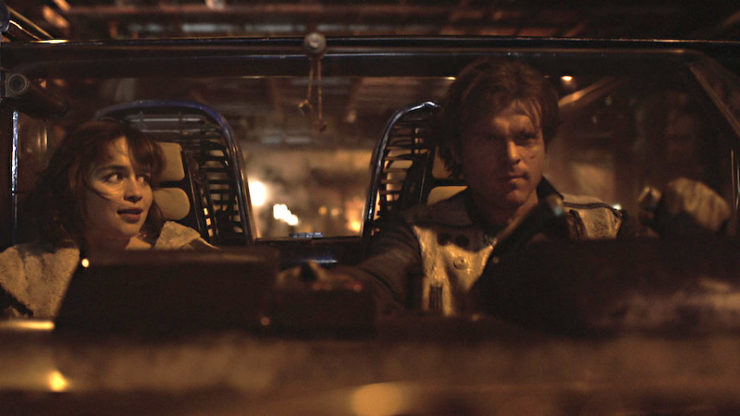
But to really get to the heart of the thing, we have to dig into the relationship that drives Han throughout the movie—his loss of and reunion with Qi’ra. At the start of the film, the duo are meant to be roughly sixteen years old, and we’re not really sure how long they’ve been together, or how long Han has been stuck in Proxima’s gang. We also later find out that Han knew his father, and knew him at an age where he was old enough to understand what his father did professionally (building YT-1300F freighters) and what he really wanted out of life (to be a pilot). So he knew a life outside of the gang, and probably got conscripted into it when his father died. He likely meets Qi’ra at some point after that, and as two teens who have been through the wringer, they make a plan to escape. It seems likely that Qi’ra has been in this life longer than Han, or that she simply listens more closely—of the two of them, she is more aware of what might happen if they are caught trying to flee, the more frightening possibilities for their futures. When they are caught on their way off-planet, Qi’ra insists that Han flee without her, and—without a clear way back to her that doesn’t end in imprisonment or worse—he does as she asks.
And Qi’ra never really makes it out of that life.
The movie is sometimes obtuse on this front, but we can assume that Qi’ra has been required to do and submit to terrible things to survive in Han’s absence, and that those things likely involve sexual abuse, coercion, spying, intimidation, and murder. Qi’ra has learned to be unbothered by the demands of her job as Dryden Vos’s lieutenant within the Crimson Dawn syndicate because this has been commonplace in the past three years of her life. Han doesn’t appear to understand this because the demands of his time as an Imperial soldier have kept him away from the criminal classes of the galaxy for a few years. When they meet again, he behaves as though they’ve barely been apart and deliberately refuses to register what she tells him about her life in the interim. Not willing to understand how deep Qi’ra has submerged in the underworld, he doesn’t suspect that she will ultimately choose to stay within Crimson Dawn, rising within its ranks after murdering Dryden.
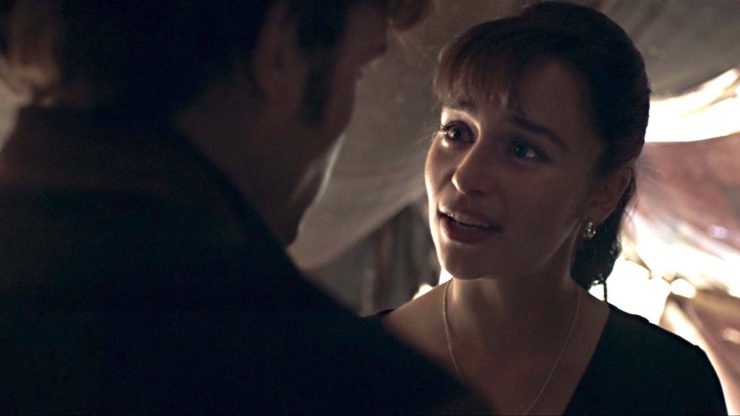
Whatever stories or films materialize between Solo and A New Hope, it is inevitable that Han and Qi’ra will meet again, and that Han will probably still want her to leave that life behind and come away with him. He will have to learn, eventually, that while she was the one who insisted that he leave Corellia without her, his doing so had eternal consequences. He cannot undo the time they have spent apart by being dashing and funny and finally available to her—he has lost someone he loved.
Funny how your experiences build your character and change your choices. Because what is Han’s first truly defining act in the Star Wars films? What puts Han on a path to joining the Skywalker family permanently, to becoming a Rebellion general, to veering sharply toward leader and hero status after insisting time and again that the only things that mattered were money and a sharp eye and survival?
He returns to save Luke Skywalker on his run to blow up the Death Star.
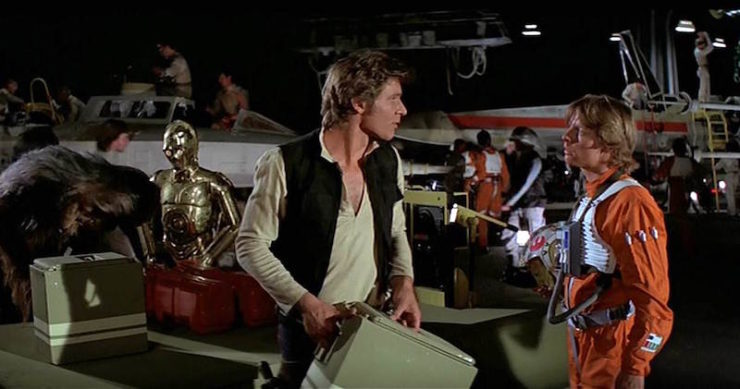
Star Wars has always known this is the most terrifying point for Han’s character, much more than being frozen in carbonite or hovering over the Sarlaac Pit. It was even borne out in the Legends books, when Han once reflected that he often woke up in cold sweats thinking about how close he had come to making that jump into hyperspace—to leaving the Rebellion behind, handing his money over to Jabba, and continuing on his way. We’re all wrapped up in whether or not Luke is going to succeed at the end of A New Hope, so we don’t get to see Han make that decision. We don’t watch him pause and sigh and tell Chewie that they’re turning around and heading back. But the truth is, Han was always going to return, and now we know why—
—because the last time he didn’t return, he lost someone. And he never got her back.
It’s such a simple set up, wonderfully underplayed, but it makes all the difference. And this turn of events, it matters more than anything else than happens in the movie, aside from Han’s first meeting with Chewie. How he got his blaster, his time in the Imperial Army, his first smuggling job, the Kessel Run, winning the Falcon from Lando, all of that is small beans by comparison. Because Han Solo isn’t a good character for being a cool cowboy type with a gun and a smirk and a fast ship. Han Solo is a good character because none of those things change the fact that he cares about people. He’s a criminal with an conscience, and that conscience wins out practically every time.
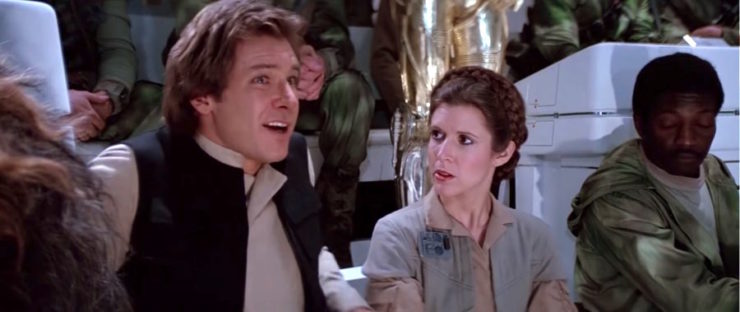
Han Solo lost Qi’ra and realized that he could stop that from happening again. He could save Luke. He could make sure the Death Star got destroyed. He could hang around the Rebellion long past his window to repay Jabba. He could linger on Hoth during the base evacuation to make certain Leia got off the planet. He could lend the Falcon back to Lando and accompany these freedom fighters in their “crazy plan” to end the Empire once and for all. And all through that, it’s never really about causes or the Force or even just doing the right thing. It’s because Han Solo doesn’t want to lose anyone that he cares about to fate or bad luck, not when he has the power to do something about it.
And if you think that’s not the point, that this isn’t always on Han’s mind, I direct you to the words he says to Leia shortly after their reunion in The Force Awakens, the reason why he’s been adrift for the past several years: “We lost our son.”
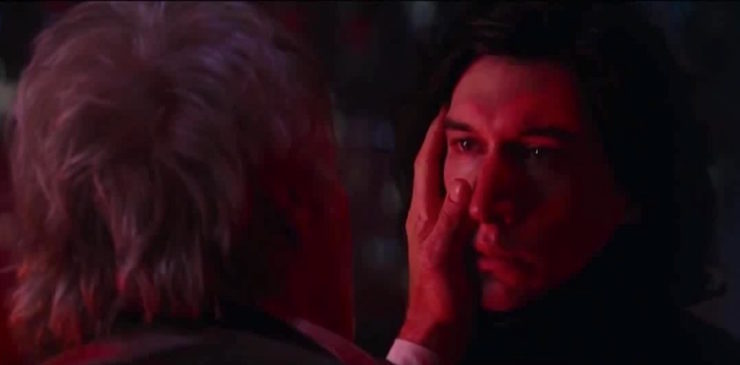
Losing someone again destroys Han—it ultimately kills him, when all is said and done. And we’ve learned from the current Star Wars novels that he spent the intervening years expanding his weird little galactic family. He trained and shepherded young pilots who needed a way out. He always had Lando’s back. He helped Chewie liberate Kashyyyk after the Empire fell. Dropping cargo isn’t something that Han Solo cares too much about in the long run, even if it gives him a boatload of trouble. But people who need him right now? Watch him drop everything, even if he rolls his eyes while he’s doing it. Even if he insists that none of it is worth it.
You don’t always get a second chance to help someone. Han Solo learned that very early on in life, and spent the rest of it being mindful of that fact. The greatest legacy that Solo leaves behind will always be that kernel of backstory; when the film wasn’t too busy trying to explain away Han’s circumstances, it explained the most important thing of all—his heart.
Emmet Asher-Perrin has said for years that Han Solo is not a “cool guy”, and this movie definitely proved that. You can bug her on Twitter and Tumblr, and read more of her work here and elsewhere.










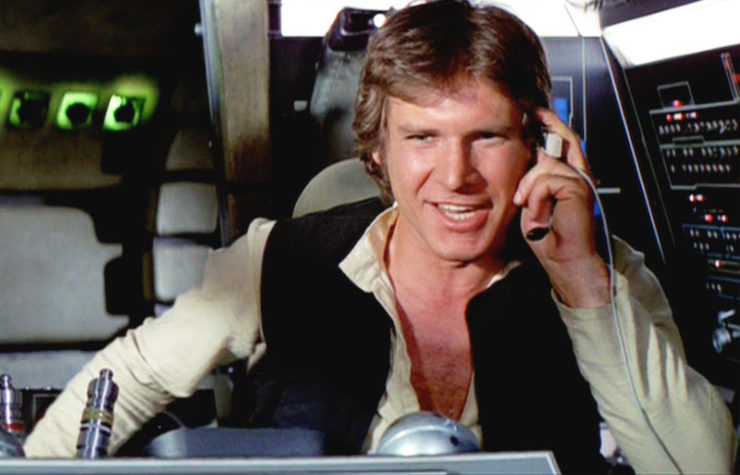
Thank you for finally pointing this element of the film out.
YES. THIS. All of this. <3
When Han and Qi’ra are on Corellia, it is 13 BBY and Han is 19 years old. In the sections of the movie that take place 3 years later, he’s 22 .The article states that Han was 16 in the opening scene on Corellia which is incorrect.
(Also worth noting that Han’s father died when he was 13 in about 19 BBY, the year the Empire rose to power.)
And lets not forget that Solo destroyed Cherwbacca’s character. We know now that Chewie EATS people.
I like the early hints about his cockiness, too. He steps forward to invent his line about the Falcon being full of soldiers who will emerge any minute, he’s not intimidated by Lando’s Sabaac table, he’s ready to swindle some very dangerous people. By the time he says “Hey – it’s me” in ROTJ, he’s already been him for a long, long time.
@@@@@ no. 4
I don’t think it destroyed Chewie’s character at all – Chewie is shown as a loyal companion, bright, strong, knowledgable and amusing. Him eating people is more of a comment on how screwed up and xenophobic the Empire is rather than a reflection on his character.
It’s not much of a stretch to imagine that if you were captured, starved and forced to eat only what you could kill then a bit of “hmmm, tastes like chicken” might be on the cards.
“Uh, had a slight weapons malfunction. But, uh, everything’s perfectly all right now. We’re fine. We’re all fine here, now, thank you. How are you?”
Smooth as ice.
Excellent!
Emmet Asher-Perrin, you always make so much sense and always shed so much light on popular culture. I think your essays are consistently the best on this site — the most insightful, the most well-reasoned, the most emotionally affecting. There’s a lot of fluff on this site, and that’s okay, because people like fluff. But your articles always MEAN something, even when you post about a fluffy topic.
Thanks for being what you are.
You know, i think you’re right about Han. I looked at him in a simpler way, that all the things he did were because basically he had a good heart. And, you talked about his subsequent actions being because he lost Qi’ra, i’ll see that and raise you the loss of his father and the results of that loss. No mention of his mother. Another loss. I haven’t read many of the books that have been mentioned, guess I’ll have to catch up.